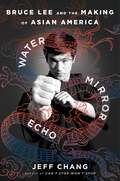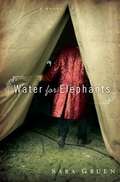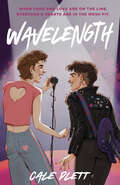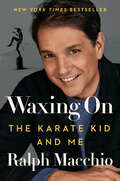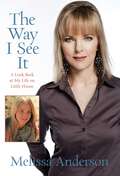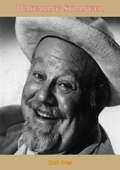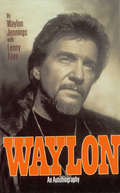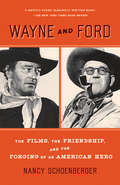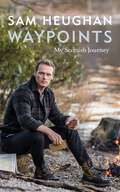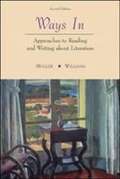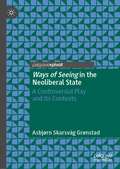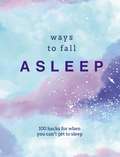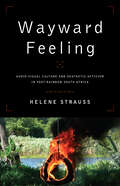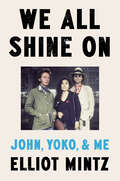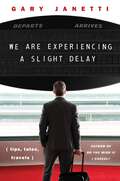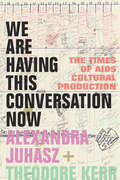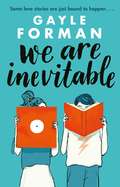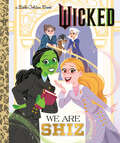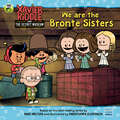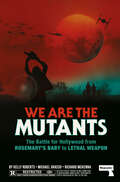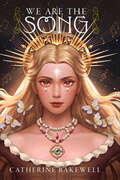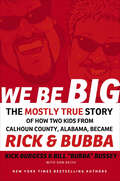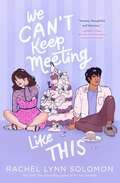- Table View
- List View
Water Mirror Echo: Bruce Lee and the Making of Asian America
by Jeff Chang"Water Mirror Echo is a remarkable story of a man, the traditions and communities that created him, and the new worlds he made possible. Like Bruce Lee himself, Jeff Chang is blessed with the vision to see things we do not yet see, thinking and writing with a restless, chasm-crossing, almost prophetic ambition." — Hua Hsu, Pulitzer Prize-winning author of Stay True: A Memoir <P><P> "This book is as celebratory as it is incisive, as it is, at times, heartbreaking. A massive achievement." — Hanif Abdurraqib, National Book Award-winning author of There’s Always This Year and A Little Devil in America <P><P> A cultural biography, both sweeping and intimate, of the legend Bruce Lee, set against the extraordinary, untold story of the rise of Asian America—from the author of the award-winning classic Can’t Stop Won’t Stop and one of the finest culture observers of our era. <P><P> More than a half-century after his passing, Bruce Lee is as towering a figure to people around the world as ever. On his path to becoming a global icon, he popularized martial arts in the West, became a bridge to people and cultures from the East, and just as he was set to conquer Hollywood once and for all, he died of cerebral edema at age thirty-two. It’s no wonder that Bruce Lee’s legend has only bloomed in the decades since. Yet, in so many ways, the legend has eclipsed the man. <P><P> Forgotten is the stark reality of the baby boy born in segregated San Francisco, who spent his youth in war-ravaged, fight-crazy Hong Kong. Forgotten is the curious teenager who found his way back to America, where he embraced West Coast counterculture and meshed it with the Asian worldviews and philosophies that reared him. Forgotten is the man whose very presence broke barriers and helped shape the idea of what being an Asian in America is, at the very dawn of Asian America. <P><P> Water Mirror Echo—a title inspired by Bruce Lee’s own way of moving, being and responding to the world—is a page-turning and powerful reminder. At the helm is Jeff Chang, the award-winning author of Can’t Stop Won’t Stop, whose writing on culture, politics, the arts and music have made him one of the most acclaimed and distinctive voices of our time. In his hands, Bruce Lee’s story brims with authenticity. <P><P> Now, based on in-depth interviews with Lee’s closest intimates, thousands of newly available personal documents, and featuring dozens of gorgeous photographs from the family’s archive, Chang achieves the nearly impossible. He reveals the man behind the enduring iconography and stirringly shows Lee’s growing fame ushering in something that’s turned out to be even more enduring: the creation of Asian America.
Water for Elephants: A Novel
by Sara GruenJacob Jankowski's 90-year-old mind remembers when he was a young veterinarian, traveling with a Depression-era circus.
Wavelength
by Cale PlettHannah Montana meets Heartstopper in this story of a teen pop star on the run from fame who finds family, love and gender euphoria when they become entangled with a local band. Seventeen-year-old pop sensation Sasha may be famous, but they’ve always kept a layer of anonymity by covering their face to perform. Facing pressure to unmask in public, Sasha runs away to a nowhere midwestern city, planning to finish senior year and come out as nonbinary away from the limelight. But their plan falters from the moment they meet Wavelength, an alt-rock band, and their lead singer. Lillian is struggling to keep the band together, caught in a mess of lyrics, late-night texts and ill-conceived love notes. She’s torn between feelings for her ex-girlfriend (and ex-bandmember) and her new infatuation with Sasha. Maybe this stranger is the new singer and the new love she’s looking for — even though Sasha’s stories don’t seem to quite add up. If a whisper of Sasha’s fame gets out, their new life is over. Sasha’s manager is tracking them down, Wavelength is on the rise, and everyone’s hearts are in the mosh pit. Turn off the houselights. The band’s counting in. Key Text Features chapters dialogue lyrics
Waxing On: The Karate Kid and Me
by Ralph MacchioSince The Karate Kid first crane-kicked its way into the pop culture stratosphere in June 1984, there hasn’t been a week Ralph Macchio hasn’t heard friendly shouts of “Wax on, wax off” or “Sweep the leg!” Now, with Macchio reprising his role as Daniel LaRusso in the #1 ranked Netflix show Cobra Kai, he is finally ready to look back at this classic movie and give the fans something they’ve long craved. <p><p>The book will be Ralph Macchio’s celebratory reflection on the legacy of The Karate Kid in film, pop culture, and his own life. It will be a comprehensive look at a film that shaped him as much as it influenced the world. Macchio will share an insider's perspective of the untold story behind his starring role—the innocence of the early days, the audition process, and the filmmaking experience—as well as take readers through the birth of some of the film’s most iconic moments. <p><p>Ultimately, the book centers on the film itself, focusing on the reason that the characters and themes have endured in such a powerful way and how these personal experiences have impacted Macchio's life. It will bring readers back to the day they met Daniel LaRusso and Mr. Miyagi for the first time, but will also provide a fascinating lens into how our pasts shape all of us and how the past can come back to enrich one's life in surprising and wonderful ways. <p> <b>New York Times Bestseller</b>
Way I See It: A Look Back at My Life on Little House
by Melissa AndersonWhen other girls her age were experiencing their first crushes, Melissa Sue Anderson was receiving handwritten marriage proposals from fans as young, and younger, than she was. When other girls were dreaming of their first kiss, Melissa was struggling through hers in front of a camera. From age eleven in 1974 until she left the show in 1981, Melissa Anderson literally grew up before the viewers of Little House on the Prairie.Melissa, as Mary, is remembered by many as &“the blind sister&”—and she was the only actor in the series to be nominated for an Emmy. In The Way I See It, she takes readers onto the set and inside the world of the iconic series created by Michael Landon, who, Melissa discovered, was not perfect, as much as he tried to be. In this memoir she also shares her memories of working with guest stars like Todd Bridges, Mariette Hartley, Sean Penn, Patricia Neal, and Johnny Cash.In addition to stories of life on the set, Melissa offers revealing looks at her relationships off-set with her costars, including the other Melissa (Melissa Gilbert) and Alison Arngrim, who portrayed Nellie Oleson on the show. And she relates stories of her guest appearances on iconic programs such as The Love Boat and The Brady Bunch.Filled with personal, revealing anecdotes and memorabilia from the Little House years, this book is also a portrait of a child star who became a successful adult actress and a successful adult. These are stories from &“the other Ingalls sister&” that have never been told.
Wayfaring Stranger (American Autobiography Ser.)
by Burl IvesFirst published in 1948, this autobiography from Burl Ives, whom Carl Sandberg calls “the greatest folk ballad singer of them all,” is as fresh and wholesome as a summer’s breeze out of an Illinois cornfield. His ballads have long been an authentic expression of his land and its people—songs his grandmother taught him in the Midwestern farm country, songs remembered by old-timers in small towns all over the land, songs he heard hobos singing—songs we have come to know and love.In Wayfaring Stranger, writing in the stirring imaginative language of the ballad, Burt Ives tells of a night spent in a haystack with a pig, and of a brief fight with a railroad cop on top of a boxcar. He hitched a ride with Al Capone’s master bootlegger; he barely escaped the clutches of an old maid in Maine; he fell in love on a Great Lakes steamer; he played for evangelists and politicians; in speakeasies and public parks. Always he listened to the people, and he learned their songs. Anywhere he could get an audience, he sang his ballads: Barbara Allen, The Riddle Song, Fair Eleanor, Old Smokey, Silver Dagger, Foggy Foggy Dew.Now in Wayfaring Stranger, he has written his own story—as warm and appealing as the songs he sings.“It’s a fine book, warm, and full-bided, like Burl himself. Burl gives the reader the combination which is in everything he sings: a sense of dignity without pretentiousness, of simplicity without sentimentality. He makes the folk feeling richly alive. Some of his little character sketches remind me of the unforgettable etchings in Sherwood Anderson’s Winesburg. In short, Burl tells stories just the way he plays and sings—naturally, unaffectedly, poignantly.”—Louis Untermeyer
Waylon: An Autobiography
by Waylon Jennings Lenny KayeWaylon Jennings relates the story of his life as a country music star. His beginnings were poor but he became Buddy Holly's protege before sinking into drug abuse and 3 failed marriages. His success came when he met his present wife, Jessi Colter.
Wayne and Ford: The Films, the Friendship, and the Forging of an American Hero
by Nancy SchoenbergerJohn Ford and John Wayne, two titans of classic film, made some of the most enduring movies of all time. The genre they defined—the Western—and the heroic archetype they built still matter today. For more than twenty years John Ford and John Wayne were a blockbuster Hollywood team, turning out many of the finest Western films ever made. Ford, known for his black eye patch and for his hard-drinking, brawling masculinity, was a son of Irish immigrants and was renowned as a director for both his craftsmanship and his brutality. John “Duke” Wayne was a mere stagehand and bit player in “B” Westerns, but he was strapping and handsome, and Ford saw his potential. In 1939 Ford made Wayne a star in Stagecoach, and from there the two men established a close, often turbulent relationship. Their most productive years saw the release of one iconic film after another: Rio Grande, The Quiet Man, The Searchers, She Wore a Yellow Ribbon, The Man Who Shot Liberty Valance. But by 1960 the bond of their friendship had frayed, and Wayne felt he could move beyond his mentor with his first solo project, The Alamo. Few of Wayne’s subsequent films would have the brilliance or the cachet of a John Ford Western, but viewed together the careers of these two men changed moviemaking in ways that endure to this day. Despite the decline of the Western in contemporary cinema, its cultural legacy, particularly the type of hero codified by Ford and Wayne—tough, self-reliant, and unafraid to fight but also honorable, trustworthy, and kind—resonates in everything from Star Wars to today’s superhero franchises. Drawing on previously untapped caches of letters and personal documents, Nancy Schoenberger dramatically narrates a complicated, poignant, and iconic friendship and the lasting legacy of that friendship on American culture.
Waypoints: My Scottish Journey
by Sam HeughanJourney deep into the Scottish Highlands in the first memoir by #1 New York Times bestselling author and award-winning star of Outlander, Sam Heughan—exploring his life and reflecting on the waypoints that define him"I had to believe, because frankly, I had come so far there could be no turning back." In this intimate journey of self-discovery, Sam sets out along Scotland's rugged ninety-six-mile West Highland Way to map out the moments that shaped his views on dreams and ambition, family, friendship, love, and life. The result is a love letter to the wild landscape that means so much to him, full of charming, funny, wise, and searching insights into the world through his eyes. Waypoints is a deeply personal journey that reveals as much about Sam to himself as it does to his readers.
Ways In
by Gilbert H. Muller John A. WilliamsBridging the gap between literary and composition theory, Ways In is a concise, integrated guide to critical reading, thinking, and writing about literature.
Ways of Seeing in the Neoliberal State: A Controversial Play and Its Contexts
by Asbjørn Skarsvåg GrønstadThis book focuses on the theme of counter-surveillance in art through a multi-faceted engagement with the highly controversial Norwegian play Ways of Seeing. Denounced by the prime minister and subject to a police investigation, the play gained notoriety when it featured footage showing the homes of the country’s financial and political elite as part of its scenography. The book provides a thorough consideration of the work’s reception context before elucidating its relation to the politics of neoliberalism. What is foregrounded in this analysis are, first, the use of an aesthetics of sousveillance to visualize the material infrastructure of racism and right-wing populism, second, the tangled interrelations of art and law, third, questions of censorship and artistic freedom, and fourth, the promotion of an alternative mode of political governance – grounded in feminism and ecological awareness – through the example of the Rojava experiment.
Ways to Fall Asleep: 100 Hacks for When You Can't Get to Sleep
by PyramidKeep this book by your bedside as the ultimate aid for nodding off in no time.In this handy little book you'll find a whole range of tips, tricks and relaxing activities to help you switch off and unwind. From dot-to-dots and colouring-in to meditations and yoga poses, you'll find all you need to wind down at the end of a stressful day and relax in preparation for a restful night's sleep.
Ways to Fall Asleep: 100 Hacks for When You Can't Get to Sleep
by Ways to Fall AsleepKeep this book by your bedside as the ultimate aid for nodding off in no time.In this handy little book you'll find a whole range of tips, tricks and relaxing activities to help you switch off and unwind. From dot-to-dots and colouring-in to meditations and yoga poses, you'll find all you need to wind down at the end of a stressful day and relax in preparation for a restful night's sleep.
Wayward Feeling: Audio-Visual Culture and Aesthetic Activism in Post-Rainbow South Africa (African & Diasporic Cultural Studies)
by Helene StraussInventive new methods of audio-visual mediation and aesthetic activism have been giving shape, since at least the mid-2000s, to feelings of despair, disappointment, and rage at the injustice that South Africa’s colonial and apartheid histories continue to trail in their wake. Wayward Feeling reveals how racism, sexism, and other forms of structural disenfranchisement have continued to assert themselves in affective terms, and how these terms have been recast in spaces both public and intimate in "post-rainbow" times. Helene Strauss argues that the tension between aspiration and achievability has yielded modes of feeling that increasingly disrupt the thrall of post-apartheid nation-building and reconciliation myths, even as wide-spread attachment to the utopian ideals of the anti-apartheid struggle continues to shape dissenting political organising and cultural production. Drawing on a variety of audio-visual forms – including video installations, conceptual artwork, documentary film, live art, and sonic installations – Wayward Feeling examines some of the affective resources that people in contemporary South Africa have been drawing on to make difficult lives more bearable.
We All Shine On: John, Yoko, and Me
by Elliot MintzA personal and revealing look at the last ten years of John Lennon&’s life and his partnership with Yoko Ono, written by the friend who knew them best In 1972, Elliot Mintz installed a red light in his bedroom in Laurel Canyon. When it started flashing, it meant that either John Lennon or Yoko Ono—or sometimes both—were calling him. Which they did almost every day for nearly ten years, engaging Mintz in hours-long late-night phone conversations that all but consumed him for the better part of a decade. In We All Shine On, Mintz—a former radio and television host in Los Angeles—recounts the story of how their unlikely friendship began and where it led him over the years, revealing the ups and downs of a wild, touching, heartbreaking, and sometimes shocking relationship. Mintz takes readers inside John and Yoko&’s inner sanctums, including their expansive seventh-floor apartment in New York&’s fabled Dakota building, where Mintz was something of a semipermanent fixture, ultimately becoming the Lennons' closest and most trusted confidant. Mintz was with John and Yoko through creative highs, relationship and private challenges, fascinating interactions with the other former Beatles, and the happiest moment of their lives together, the birth of their son, Sean. He was also by Yoko&’s side during the aftermath of John&’s assassination on the doorstep of the Dakota—not merely a witness to it all, but a key figure in the drama of John and Yoko&’s extraordinary lives. We All Shine On is a must-read for Beatles and Lennon fans, offering an up close and intimate view of one of the most celebrated artists of the twentieth century, as well as one of the most fascinating marriages. But it&’s also a relationship story that just about everyone can relate to, a tale about partnership, loyalty, and trust, and most of all, the lasting legacy of a true and deep friendship.
We Are Experiencing a Slight Delay: (tips, tales, travels)
by Gary JanettiA Town & Country Must-Read Book of Summer 2024!"A delightful and sharp-witted tour through a lifetime’s worth of travel exploits and misadventures. . . . Readers are bound to catch the travel bug." — Publishers WeeklyIn this hilarious and often touching collection, the New York Times bestselling author, television writer, and producer takes us with him on travels across the globe.Gary Janetti has gained a devoted following, with a huge audience on social media, and two bestselling collections of essays under his belt. His new collection will prompt laughter but also delighted recognition as Janetti tackles the absurdity and glory of travel.In We Are Experiencing a Slight Delay, he shares stories of his varied trips around the world. Tag along as he enjoys an unexpectedly transformative stay at a rigorous Italian spa where he and his husband go from deep grumpiness to exaltation. Take a ride on the Orient Express to Venice and discover a surprising side of London, including a hilarious dinner with actress Maggie Smith. And pull up a deck chair to watch the entertainment as Gary embarks on a family cruise on the Queen Mary 2.Interspersed with recollections of his trips are personal meditations on dining alone as well as journeys to such diverse destinations as Mykonos, Australia, a Noma pop-up, and other glamorous spots. Gary is unabashedly frank about his very exacting travel needs, and delivers practical advice on all aspects of the traveler’s life, from very precise packing instructions, suggestions on how to get upgrades, and restaurant and hotel recommendations in his favorite cities.Aspirational, charmingly acerbic, and as diverting as the best vacation can be, delivering both laughs and moments of sharp recognition, Gary’s funny collection is the perfect getaway companion, for both seasoned nomads and curious armchair travelers.
We Are Having This Conversation Now: The Times of AIDS Cultural Production
by Alexandra Juhasz Theodore KerrWe Are Having This Conversation Now offers a history, present, and future of AIDS through thirteen short conversations between Alexandra Juhasz and Theodore Kerr, scholars deeply embedded in HIV responses. They establish multiple timelines of the epidemic, offering six foundational periodizations of AIDS culture, tracing how attention to the crisis has waxed and waned from the 1980s to the present. They begin the book with a 1990 educational video produced by a Black health collective, using it to consider organizing intersectionally, theories of videotape, empowerment movements, and memorialization. This video is one of many powerful yet overlooked objects that the pair focus on through conversation to understand HIV across time. Along the way, they share their own artwork, activism, and stories of the epidemic. Their conversations illuminate the vital role personal experience, community, cultural production, and connection play in the creation of AIDS-related knowledge, archives, and social change. Throughout, Juhasz and Kerr invite readers to reflect and find ways to engage in their own AIDS-related culture and conversation.
We Are Inevitable
by Gayle FormanA heartbreaking story about finding yourself and your people, from the bestselling author of If I Stay, a major film starring Chloë Grace Moretz. For fans of The Perks of Being a Wallflower, John Green and Nick and Norah&’s Infinite Playlist.'I got this whole-body feeling . . . it was like a message from future me to present me, telling me that in some way we weren&’t just bound to happen, that we had, in some sense, already happened. It felt . . . inevitable.' So far, the inevitable hasn&’t worked out so well for Aaron Stein. While his friends have gone to college and moved on with their lives, Aaron&’s been left behind in the Cascade Mountains of Washington State, running a failing bookshop with his dad, Ira. What he needs is a lucky break, the good kind of inevitable. And then he meets Hannah. Incredible Hannah – magical, musical, brave and clever. Could she be the answer? And could they – their relationship, their meeting – possibly be the inevitable Aaron&’s been waiting for?
We Are Shiz (Little Golden Book)
by Mary Man-KongElphaba, Glinda, Fiyero, Nessarose, and Boq star in this Little Golden Book based on Universal Pictures&’ blockbuster film Wicked!Welcome to Shiz University, where knowledge meets magic! Meet Shiz students Elphaba, Glinda, Fiyero, Nessarose, and Boq, as they star in this Little Golden Book based on Universal Pictures&’ Wicked!Little Golden Books enjoy nearly 100% consumer recognition. They feature beloved classics, hot licenses, and new original stories . . . the classics of tomorrow.
We Are the Brontë Sisters (Xavier Riddle and the Secret Museum)
by Brooke VitaleAn 8x8 with 2 sticker sheets based on an episode from the PBS KIDS animated television series Xavier Riddle and the Secret Museum starring the Brontë sisters.Based on the children's book series Ordinary People Change the World by New York Times bestselling author Brad Meltzer and illustrator Christopher Eliopoulos, the series will introduce kids to inspiring historical figures and the character virtues that helped them succeed. When Brad runs out of ideas for his latest story, the Secret Museum sends him, Xavier, and Yadina to meet the Brontë sisters! Together, they use their imaginations to create new, wonderful, and incredibly fun stories. This episode-based 8x8 will focus on the traits that made our heroes great--the traits that kids can aspire to in order to live heroically themselves.
We Are the Mutants: The Battle for Hollywood from Rosemary's Baby to Lethal Weapon
by Kelly Roberts, Michael Grasso and Richard McKennaAn offbeat odyssey through the most daring and disruptive phase of American cinema since the advent of sound — during the most transformative and tumultuous period of American history since the Civil War.We Are the Mutants is a critical reassessment of what is arguably the most discussed and beloved stretch of movies in Hollywood history.Documenting the period between the arrival of US combat troops in Vietnam and the end of President Ronald Reagan&’s second term, it forgoes the usual and restrictive exemplars of &“auteur cinema,&” and instead focuses on an eclectic selection of films and genres — horror, documentary, disaster, vigilante action, neo-noir, post-apocalyptic sci-fi — to track this period's tumultuous transformation in American life, culture, and politics.Covering everything from Rosemary&’s Baby and Enter the Dragon to Escape from New York and Fatal Attraction, and from manufactured blockbusters and studio sleepers to forgotten Bs and cult classics, We Are the Mutants re-writes the history of modern American cinema, and in doing so, the history of America itself.
We Are the Song
by Catherine BakewellA lush and beautiful fantasy set in a world where music is magic and the fate of many thrones lies with one girl…Twelve-year-old Elissa has been raised in seclusion as a devotee of the Mother Goddess. She is a special child, a blessed child, a child who can sing miracles into being. Her voice can heal wounds, halt landslides, cure hunger—and even end wars. But there are those who would use her gift for darker things. And when Elissa finds herself the farthest from home she&’s ever been—along with her vain and jealous music tutor, Lucio—she will have to develop the judgment to decide who wants to use her song to heal… and who wants to use her song to hurt.
We Be Big: The Mostly True Story of How Two Kids from Calhoun County, Alabama, Became Rick & Bubba
by Rick Burgess Don Keith Bill "Bubba" BusseyThe New York Times–bestselling authors tell the inspiring story of their rise to talk radio fame—and the ups and downs of their lives off the air. If you’ve ever started your day with Rick and Bubba, you know the unmistakable drawl of those two crazy Alabama boys. What you may not know is that they almost weren’t “Rick and Bubba.”From their glory days of homemade “radio stations,” youthful athletic ambition, and redneck Shakespearean monologues, Rick and Bubba spent decades working out the personalities you hear today on their syndicated morning talk show. Born in a little studio behind a skating rink, The Rick & Bubba Show filled the airwaves with a voice never before heard on morning radio.We Be Big follows the winding road that led Rick Burgess and Bill “Bubba” Bussey onto the right path after years of missing the off-ramp. Find out how what started as a comedy routine evolved into a genuine conversation that more than 3.5 million people listen in on each week; and learn all the stories behind Rick and Bubba’s famous on-air hijinks, times of uncertainty, and unwavering faith in the face of tragedy.Meet the two “sexiest fat men alive,” and experience the hilarity and heartbreak of their unforgettable story.
We Can't Keep Meeting Like This
by Rachel Lynn SolomonA wedding harpist disillusioned with love and a hopeless romantic cater-waiter flirt and fight their way through a summer of weddings in this effervescent romantic comedy from the acclaimed author of Today Tonight Tomorrow.Quinn Berkowitz and Tarek Mansour&’s families have been in business together for years: Quinn&’s parents are wedding planners, and Tarek&’s own a catering company. At the end of last summer, Quinn confessed her crush on him in the form of a rambling email—and then he left for college without a response. Quinn has been dreading seeing him again almost as much as she dreads another summer playing the harp for her parents&’ weddings. When he shows up at the first wedding of the summer, looking cuter than ever after a year apart, they clash immediately. Tarek&’s always loved the grand gestures in weddings—the flashier, the better—while Quinn can&’t see them as anything but fake. Even as they can&’t seem to have one civil conversation, Quinn&’s thrown together with Tarek wedding after wedding, from performing a daring cake rescue to filling in for a missing bridesmaid and groomsman. Quinn can&’t deny her feelings for him are still there, especially after she learns the truth about his silence, opens up about her own fears, and begins learning the art of harp-making from an enigmatic teacher. Maybe love isn&’t the enemy after all—and maybe allowing herself to fall is the most honest thing Quinn&’s ever done.
We Danced All Night: My Life Behind the Scenes with Alan Jay Lerner
by Doris ShapiroMrs. Shapiro's 14 years as an assistant to Alan Jay Lerner, from before "My Fair Lady" to "On a Clear Day You Can See Forever."
